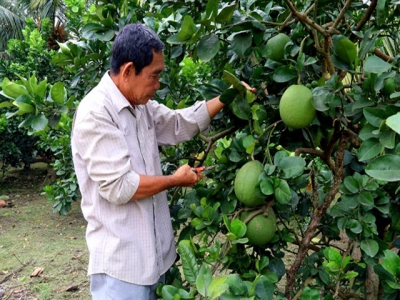Tiền Giang Province finds fruit farming profitable, plans expansion

TIỀN GIANG — The Cửu Long (Mekong) Delta province of Tiền Giang, the country’s largest fruit producer, is expanding fruit farming since it is lucrative for farmers and has great potential.
A farmer takes care of green skin pomelo orchard in Mỹ Tho City, Tiền Giang Province. — VNA/VNS Photo Minh Trí
Farmers here grow a range of fruits depending on soil and water conditions in their area.
For instance, in Cái Bè, Cai Lậy and Châu Thành districts, which have a dense network of rivers and canals and fertile soil, they grow specialty fruits such as Hòa Lộc mango, Ngũ Hiệp durian, Tân Phong rambutan, and Lò Rèn Vĩnh Kim milk apple.
In Tân Phước District where the soil is affected by alum, they grow pineapple.
The province has more than 77,000ha of orchards, or nearly 40 per cent of its farming land, according to its Department of Agriculture and Rural Development.
It has encouraged farmers to develop a model comprising farm land, a pond and an animal pen for crops, fish and livestock.
Trần Thanh Phong, chairwoman of the province Orchard Owners Association, said authorities plan to create concentrated fruit-growing areas.
In the past five years, the association, in co-operation with the province Agriculture Extension Centre, has organised 3,700 training courses in advanced techniques such as Vietnamese and global good agricultural practices (VietGAp and GlobalGAP) for farmers and encouraged them to choose high-quality seedlings.
It has also established fruit farm and garden, pond and animal pen models for farmers to visit and learn.
They have also been taught advanced farming techniques like growing crops in net houses.
Phong said the province has some 50 net houses where honeydew melon is grown, annually earning VNĐ100-120 million ($4,280-5,140) per 1,000 square meters.
There are 1,640 medium and small agricultural farms with infrastructure, mostly orchards, according to the association.
They have an average area of 4.5ha and farmers have developed mixed production models, including the garden, pond and animal pen model.
Farmers now grow specialty fruits with high export value on 9,850ha of what used to be low-yield rice paddies, according to the People’s Committee.
This has tripled and even quadrupled farmers’ incomes, it said.
Concentrated growing areas
The province has created concentrated fruit growing areas to grow large quantities with consistent quality to meet market demand in recent years.
It has encouraged farmer to apply VietGAP and GlobalGAP standards to produce high-quality fruits with traceable origins.
It has nearly 10,000ha under durian in Cai Lậy, Cái Bè and Tân Phước districts and 7,000ha under dragon fruit in Chợ Gạo, Gò Công Tây, Gò Công Đông, and Tân Phú districts.
It also has 16,000ha of pineapple in Tân Phước District, 1,000ha of soursop in Tân Phú Đông District and 300ha of Barbados cherry in the coastal area of Gò Công.
Tam Bình Commune in Cai Lậy has a concentrated durian growing area of nearly 1,400ha, or 87.5 per cent of its total farmland.
Đỗ Thái Hùng, who has a 5,000sq.m durian orchard in its Bình Thuận hamlet, said he harvests 10 tonnes of fruits a year.
Thanks to growing the fruit in the off season, he is able to get very high prices, he said, adding he earned VNĐ500 million (US$21,400) last year.
Nguyễn Tấn Nhũ, secretary of the commune Party's Committee, said local farmers mostly grow RI 6 and Mong Thong varieties, which have high quality and are highly in demand.
To develop its orchard economy further, the commune plans to teach farmers how to grow durian to VietGAP and GlobalGAP standards.
It also plans to set up a value chain for the fruit and secure sales outlets for farmers by bringing them together with companies.
With the success of Tam Bình Commune’s concentrated durian growing area model, farmers elsewhere in the province too have learnt it.
Lê Văn Nghĩa, vice chairman of the People’s Committee, said the province has boosted promotional activities for its agricultural produce at home and abroad by attending international trade fairs and striking deals with many cities in the country to supply fruits.
They include contracts with HCM City and Đà Nẵng to also supply other key agricultural products.
It has exported Chợ Gạo dragon fruit, Ngũ Hiệp durian, Lò Rèn Vĩnh Kim milk apple, and green skin and pink flesh pomelo to many markets.
Lò Rèn Vĩnh Kim milk apple has been exported to the US since 2017.
Hòa Lộc mango and green skin and pink flesh pomelo have been served on Vietnam Airlines flights since February this year.
Last year, the province exported 10,522 tonnes of various fruits for $17.2 million, up 28.3 per cent in volume and 20.1 per cent in value from the previous year.
Có thể bạn quan tâm
 Luc Ngan lychee yields some 80,000 tonnes
Luc Ngan lychee yields some 80,000 tonnes The conditions of political security and social order, facilitates the loaning procedure, credit transaction of all sides in this lychee season.
 Maize production: Managing critical plant growth stages
Maize production: Managing critical plant growth stages There is more to a maize land than meets the eye. It is a mass production facility with thousands of efficient ‘factories’ per hectare
 Tiền Giang seeks systematic farming restructure, adherence to zoning plans
Tiền Giang seeks systematic farming restructure, adherence to zoning plans Farmers would be taught advanced farming techniques and helped with reorganisation of their farming and promotion to ensure outlets for their produce